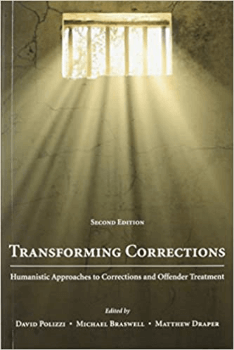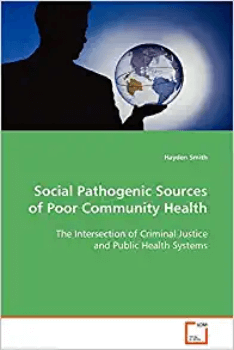Research

Hayden Smith
Professor of Criminology & Criminal Justice at the University of South Carolina.
Dr. Hayden P. Smith is a Professor of Criminology & Criminal Justice at the University of South Carolina. His principal focus of study is the intersection of the criminal justice and public health systems. Dr. Smith is a national and international expert on self-injurious and suicidal behaviors occurring in incarcerated populations. Other areas of study include mental health programs in jail and prison, officer wellness and resiliency, the Prison Rape Elimination Act (PREA), reentry initiatives, and best practices in evaluating corrections-based programs. Dr. Smith has expertise in program evaluation and policy analysis and has worked with numerous correctional and health systems, including over one million dollars in research grants. Dr. Smith’s previous publications have appeared in top-tiered journals like Justice Quarterly, Crime & Delinquency, and Criminal Justice & Behavior.
Reports
The following study features a research partnership between the Dorchester Department of Corrections(DDC) Cambridge, Maryland, a mental health therapist and registered trauma sensitive yoga instructor (Sue Radcliffe, LCSW-C/RYT 200) with local health department, and the following researchers: Dr. Hayden Smith, University of South Carolina (USC) and Alyssa Crawford, Southern New Hampshire University. The need for the study is based on an absence of research on (wellness or self-care and) correctional officers.
According to the Department of Justice (2012), “for too long, incidents of sexual abuse have not been taken as seriously as sexual abuse outside prison walls. In popular culture, prison rape is often the subject of jokes” (p. 2).
In 2015, Dr. Hayden Smith of the University of South Carolina submitted the report titled, “Program Evaluation: Character Based Units CBU’s” to the South Carolina Department of Corrections (SCDC). The report detailed the experiences of inmates and staff within the Trenton, Lee, and Perry Institution who were engaged with Character Based Units (CBU’s).
The South Carolina Department of Corrections (SCDC) is currently implementing key components of the Prison Rape Elimination Act (PREA).
This report details the perceptions of 100 staff members of the South Carolina Department of Corrections (SCDC). These data were received at the end of a day-long training, as led by Just Detention International (JDI).
In 2014, Dr. Hayden P. Smith of the University of South Carolina partnered with the South Carolina Department of Corrections (SCDC) to provide evaluation services measuring the efficacy of Character Based Units operating in Lee, Perry and Trenton Correctional Institutions.
Prison administrators devote significant attention to the harmful risks posed by incarcerated offenders within a prison milieu. To examine officer perspectives, this study focuses on the interpretation of dangers and risk within corrections.
Across the United States, a high percentage of correctional officers resign from their job shortly following their initial employment. Within the state of South Carolina, more specifically, the Department of Corrections documented a correctional officer turnover rate of approximately 34 and 35 percent during the year 2008-2009.
Self-injurious behaviors are defined as “the deliberate destruction or alteration of body tissue without conscious suicidal intent” (Favazza, 1989, p. 137; see also Favazza & Rosenthal, 1993,for discussion).Within incarcerated populations the “typical” manifestation of self-injury involves inmates cutting themselves with or without an object or inserting objects into their bodies.
Published Works
Criminal Justice And Public Health 1st Edition
The criminal justice system now serves as the chief provider of health care services to a significant portion of society. This includes the provision of physical and mental health care for offender populations who require substantial health care resources. To date, little is known or understood with regard to how these services and programs are being delivered. This book addresses the gaps in our knowledge by presenting a range of studies detailing the daily practices that occur in places where criminal justice and public health systems intersect. This includes an assessment of sheriff agency emergency communication systems, a study of problem behaviours and health using a juvenile sample, the challenge of treating mentally ill prison inmates with note of important gender differences, the impact of case management on justice systems, and a review of substance abuse cessation programs among pregnant women currently serving probation and parole sentences. Also included is a policy piece in which the authors call for an integrated model that is neither criminological nor public health specific. These readings provide a range of empirical examples that highlight important successes and challenges facing the criminal justice and public health systems. They suggest that integration and partnerships represent the most efficacious means to reduce critical social problems such as violence, poor health, and criminality. This book was originally published as a special issue of Criminal Justice Studies.
Transforming Corrections: Humanistic Approaches To Corrections And Offender Treatment, Second Edition Second Edition
Transforming Corrections: Humanistic Approaches to Corrections and Offender Treatment, Second Edition offers an alternative perspective not easily found in the existing literature concerning the way in which individuals in the criminal justice system are understood and treated by those responsible for their care. This substantially revised edition of Transforming Corrections may be used as a primary source for courses focused on alternative approaches to corrections and offender treatment or as a supplementary text that will help to enhance the current conversation that is ongoing in the field of rehabilitative corrections. The wide-reaching focus of this collection is intended to provide a variety of alternative perspectives related to issues of theory, correctional practice and offender treatment. As such, Transforming Corrections could be adopted in introductory courses in criminology and criminal justice as well as graduate courses more specifically focused on issues related to offender treatment and correctional administration.
Social Pathogenic Sources Of Poor Community Health: The Intersection Of Criminal Justice And Public Health Systems
The United States currently provides a health care system that is neither efficient nor equitable. Despite outspending the world on health care, over three-fourths of developed countries produce better health outcomes. In response to these challenges the ¿Ecological School of Thought¿ has documented the impact that social, economic, and environmental circumstances play in health outcomes. This work utilized Structural Equation Modeling to assess the antecedents of sentinel health events in 309 United States counties. The adversity associated with socio-economic disadvantage, social disorganization, and a lack of health care resources, and their relationship with adverse health outcomes are explicated with clear policy implications. Support is provided for the notion that sentinel health events would be reduced through economic equity and the development of healthy environments where community social networks are promoted. Less support was found for saturating given geographical areas with health care resources in order to reduce sentinel health events. This study has relevancy for both the criminal justice and public health fields of study.
Online Publications
My research gate profile can be found here. ResearchGate is a site that provides researchers the ability to share papers, ask and answer questions, and find collaborators. A number of my publications are available on this site.



